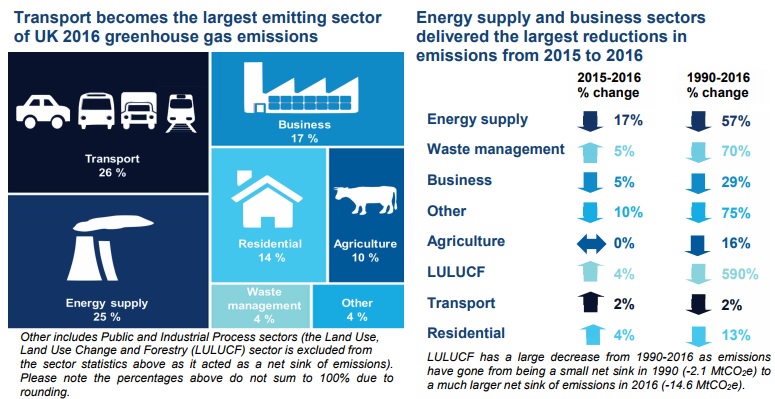Six ways transport can help combat climate change
Lord Deben, Chair of the UK’s Committee on Climate Change, the Government’s climate watchdog, recently called on the transport secretary to “Do more to cut transport CO2 emissions”. This follows hot on the heels of the Intergovernmental Panel on Climate Change released a special report on global warming of 1.5°C.
The report suggested that limiting global warming to 1.5°C could reduce some of the more catastrophic impacts of climate change, rather than 2°C, which has in the past been used as the threshold for ‘dangerous climate change’.
At 1.5°C, the proportion of the world’s population exposed to water stress could be 50% lower than at 2°C and food scarcity would be less of a problem. Limiting temperature increases to 1.5°C requires ‘rapid and far-reaching’ transitions in land, energy, industry, buildings, cities, and of course, transport. CO2 emissions need to fall by 45% by 2030 (from 2010 levels) and reach net zero by 2050. In the UK, transport contributes 26% of greenhouse gas emissions and, in 2016, transport became the largest emitting sector.
Transport has seen the slowest reductions in greenhouse gas emissions of any sector in the UK between 1990 and 2016, just a 2% reduction, the next lowest reduction being in the residential sector which has seen a 13% reduction over the same period. 
So what needs to happen so that urban transport can play its part in reducing carbon emissions and mitigating the worst impacts of climate change? Here are six key headlines and areas that we at the Urban Transport Group are working on:
- Creating healthy streets allows city environments to support active lifestyles and encourages green spaces, which can create urban spaces which are more resilient to the effects of climate change. Additionally, if urban spaces are pleasant, then people will remain living in the urban area, rather than moving away, and this can help reduce travel demand. We are supporting areas to implement a Healthy Streets approach as part of a year of action.
- Active travel is the ultimate low carbon travel choice. Increasingly cities are developing infrastructure and wider supportive measures to encourage active travel (as outline in our report Active Travel: Solutions for changing cities). Shifting journeys to active modes can help reduce carbon emissions from transport. New research from Sustrans showed that walking or cycling could substitute for around 41% of short car trips, saving nearly 5% of CO2 emissions from car travel.
- Boosting public transport can offer low emission alternatives to private car use. In order to maximise the public transport offer and ensure that it can contribute to reducing carbon emissions it needs to be ‘available, accessible, affordable and acceptable’. Ideally public transport should increasingly be electrified, and great work is happening in Nottingham, for example, with the electrification of the bus fleet.
- Low emission public service fleets can offer a way for local authorities to reduce their carbon emissions and to boost awareness of low emission vehicles. We highlighted Leeds City Council’s vehicle fleet in our recent report on vans.
- Managing urban freight can offer opportunities to reduce carbon emissions, as van traffic is the fastest growing sector of road traffic. Shifting freight to water and rail can offer more sustainable options than road freight. Urban consolidation and last mile innovations can also help to reduce the impact of deliveries. We set out how urban freight should be part of the effective functioning of city regions in ‘Delivering the future: New approaches to urban freight’.
- Ensuring smart mobility is part of the solution, not a contributor to the problem. By this, we mean that it is shared and electric, it delivers environmental benefits and it isn’t just more vehicles clogging up our streets and emitting carbon. We set out our vision for Smart Futures for Urban Transport here.
Climate change is happening, and we need to take dramatic measures now to avoid the worst impacts of it. Urban transport will need to play its part, and we should heed the advice of Lord Deben and climate experts. There are already examples of great work happening in our cities. We must learn from these, double our efforts and accelerate progress.
Clare Linton is Researcher at Urban Transport Group

